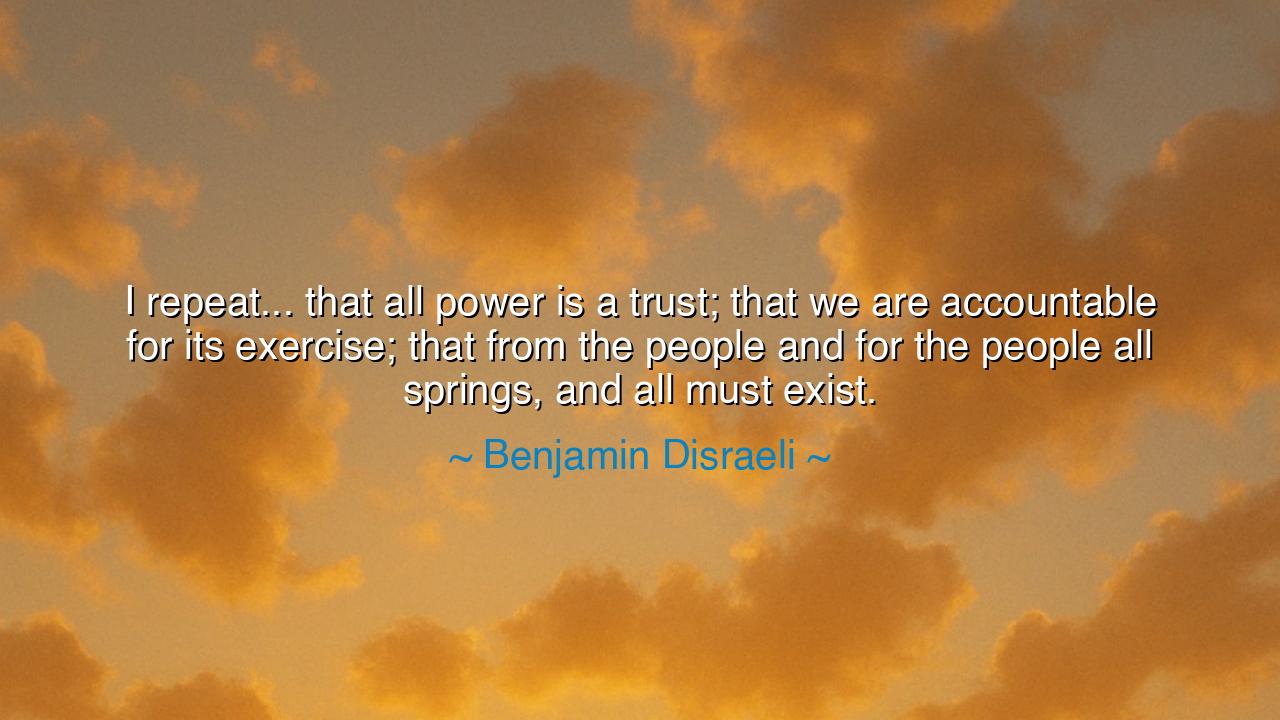
I repeat... that all power is a trust; that we are accountable
I repeat... that all power is a trust; that we are accountable for its exercise; that from the people and for the people all springs, and all must exist.






The words of Benjamin Disraeli—“I repeat… that all power is a trust; that we are accountable for its exercise; that from the people and for the people all springs, and all must exist”—resound like a proclamation carved into stone, a reminder to rulers and citizens alike that authority is never absolute, but sacred. In this declaration, Disraeli strips away the illusion that kings and statesmen hold their power by divine right or personal genius. Instead, he affirms a truth as eternal as it is humbling: power belongs to the people, it is lent to leaders, and it must be returned in justice and service.
The origin of this quote lies in Disraeli’s career as one of Britain’s most eloquent statesmen, serving twice as Prime Minister in the 19th century. A man who rose from outsider status into the very heart of government, he knew well the temptations of power, but also its burdens. In an age of empire and industrial upheaval, he spoke often of responsibility, reminding his fellow leaders that authority was not license, but trust. To him, governing was not dominion, but stewardship; not self-glory, but accountability to the people whose sweat and labor sustained the nation.
History confirms the weight of his words. Consider the fate of Louis XVI of France, who believed power was his by divine inheritance and treated it as a personal possession. His blindness to accountability cost him his throne and his life, for when rulers forget that authority is a trust, the people rise to reclaim what is theirs. By contrast, Abraham Lincoln in America embodied Disraeli’s truth. He wielded the vast powers of the presidency during civil war, but never forgot that his actions were for the people. His Gettysburg Address proclaimed the same principle in immortal words: government “of the people, by the people, for the people.”
The meaning of Disraeli’s statement is that power without accountability is corruption, and leadership without service is tyranny. He calls upon all who hold office, command, or influence to remember that their authority exists only as long as it serves the common good. The army general, the merchant, the politician, even the parent in the home—all are entrusted with power that is not their own, and all must answer for how they use it. To forget this is to betray not only the people, but the very moral law that binds society together.
There is a heroic strength in his vision as well. For in declaring that all power springs from the people, he elevates the common man and woman to the role of sovereign. The farmer, the laborer, the teacher, the artisan—these are not subjects, but the very source of authority. Leaders are but stewards of the people’s will, guardians of their rights, and servants of their welfare. The dignity of the many, not the privilege of the few, is the true foundation of government. Disraeli’s words ring as both reassurance and warning: leaders exist for the people, or they will cease to exist at all.
The lesson for us is clear: whether in government, in business, or in personal life, never see authority as ownership, but as trust. If you lead, lead with humility, knowing you must give an account. If you are led, remember that your voice, your rights, and your dignity are the wellspring of all power. Defend them, demand accountability, and never allow rulers to forget their stewardship. For when people sleep, tyranny awakens; but when people remain vigilant, freedom flourishes.
Practically, this means choosing leaders not by their promises or their charm, but by their sense of duty and accountability. It means holding them to their word, questioning when they falter, and supporting when they serve rightly. In our own lives, it means treating every role of authority—be it as a teacher, a parent, a manager—not as dominion, but as service. For every ounce of power given to us, whether great or small, is a sacred trust.
Thus, Disraeli’s words echo across the centuries: “All power is a trust… from the people and for the people all springs, and all must exist.” Let them be remembered not only as a doctrine of politics, but as a moral law of life. For in the end, it is not the crowns of rulers nor the swords of generals that endure, but the justice, service, and accountability with which they used the power entrusted to them. And this truth, carried faithfully, shall guard the dignity of generations yet to come.






AAdministratorAdministrator
Welcome, honored guests. Please leave a comment, we will respond soon